
Common Workers’ Comp Hearing Outcomes in NC: A Comprehensive Guide for Injured Employees
Originally published: September 2025 | Reviewed by Perry Morrison
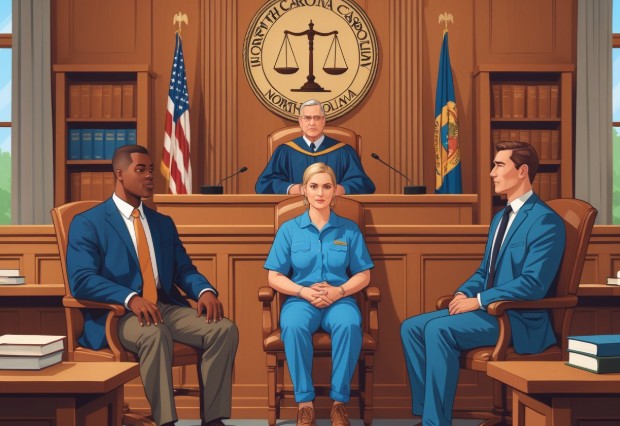
If you’re dealing with a workers’ compensation claim in North Carolina, you might feel lost in the hearing process and unsure what to expect.
Most North Carolina workers’ comp hearings end with one of four outcomes: full approval, partial approval with changes, outright denial, or a requirement for more medical evaluations.
The North Carolina Industrial Commission runs these hearings. Deputy commissioners make the decisions after reviewing medical evidence, listening to witnesses, and considering both sides.
Each outcome brings different consequences for your medical care, wage replacement, and long-term disability status. The hearing’s result can shape your financial situation and access to treatment for a long time.
Key Takeaways
- Workers’ compensation hearings in North Carolina usually end with full approval, partial approval, denial, or requests for additional medical information.
- The outcome affects your medical benefits, wage replacement, and disability ratings.
- Knowing what could happen helps you prepare and understand your appeal options.
Why Hearing Outcomes Matter In NC Workers’ Comp
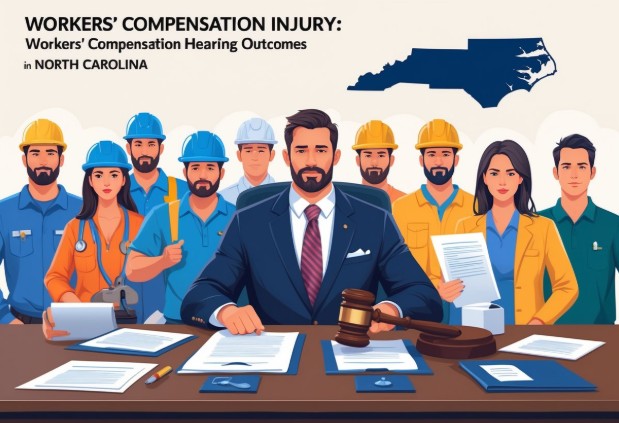
Workers’ compensation hearings in North Carolina decide what benefits and medical care you’ll actually get. If you prepare well and have solid legal help, you’ll have a much better shot at a positive result.
How Hearings Before The NC Industrial Commission Shape Your Benefits And Rights
The North Carolina Industrial Commission handles all these disputes. Deputy Commissioners decide if you’ll receive medical benefits, wage replacement, or permanent disability compensation.
Here’s what they decide:
- Medical treatment approval – Will they cover ongoing care and specialist visits?
- Wage replacement amounts – How much of your lost income will you get back?
- Permanent disability ratings – What compensation will you get for lasting injuries?
- Return-to-work timelines – When do they expect you back on the job?
The deputy commissioner’s ruling can affect every part of your recovery. It’s not just about money—it’s about whether you’ll get the care you need to heal and move forward.
Hearing outcomes sometimes set precedents for future claims. If you get a favorable ruling, you might have an easier time getting more help if your injury causes more issues later.
Common Uncertainties Injured Workers Face
If you’re new to the system, it’s easy to feel overwhelmed by the legal maze. Filing for a hearing can be nerve-wracking, especially when you don’t know what’s coming.
Biggest worries include:
| Uncertainty | Impact on Worker |
| Claim denial reasons | Loss of medical coverage and income |
| Evidence requirements | Inadequate case preparation |
| Hearing procedures | Poor performance during testimony |
| Appeal processes | Extended delays in benefit payments |
Gathering the right medical records can feel like a scavenger hunt. It’s not always clear which doctor’s opinion will matter most or how to explain your limitations in a way that sticks.
Timelines are another headache. Most folks don’t know how long the process takes or when they’ll finally hear about their benefits.
The legal jargon in the workers’ comp system can be a real barrier. It’s all too easy to miss a deadline or submit incomplete paperwork just because the language is confusing.
The Importance Of Preparation And Legal Support
Preparing for your hearing can make a significant difference. If you know what to expect and bring the right evidence, your case will look a lot stronger.
What helps most:
- Organize your medical records – Make sure you’ve got everything related to your injury and treatment
- Line up witnesses – Coworkers or supervisors who actually saw what happened
- Find supporting experts – Doctors or specialists who back up your disability claims
- Gather other evidence – Photos, incident reports, employment records—anything that can help
Having a lawyer can really tip the scales. Attorneys know the system, the paperwork, and how to argue your case in a way that gets attention.
Good lawyers will:
- File everything on time
- Ask the right questions and poke holes in the other side’s arguments
- Try to negotiate a settlement before things get formal
- Appeal if you don’t like the decision
Going it alone isn’t easy. Insurance company lawyers do this every day, so having your own expert can level the playing field.
What Are The Common Outcomes At NC Workers’ Comp Hearings?
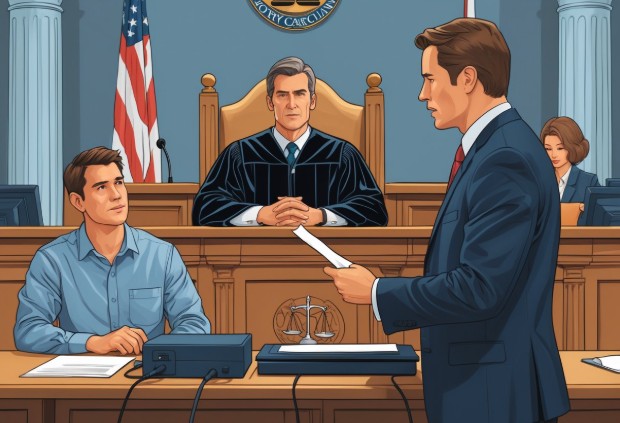
Hearings in North Carolina typically conclude with one of four outcomes: benefit awards (accompanied by a set wage replacement), decisions regarding medical treatment, claim denials, or delays while awaiting additional documentation.
The deputy commissioner’s decision really depends on the medical evidence and testimony you bring.
Award Of Benefits: Wage Replacement Based On Impairment Ratings
If the deputy commissioner approves your claim, they’ll use North Carolina’s formulas to figure out your benefits. Most often, you’ll get wage replacement equal to two-thirds of your average weekly wage before the injury.
Temporary Total Disability is paid at your “compensation rate,” two-thirds of your average weekly wage for the 52 weeks prior to the work accident, while you’re completely out of work. This process continues until you reach maximum medical improvement or return to work. It is not full wage replacement
Permanent Partial Disability depends on impairment ratings from your doctor. The Industrial Commission publishes a rating guide that assigns a value for each body part and injury level.
Say you get a 10% permanent impairment to your back. They’ll calculate your benefits as a percentage of your pre-injury wages, but the exact amount depends on your compensation rate and the rating.
Permanent Total Disability is for people who can’t do any work at all because of their injury. You’ll need strong medical evidence showing you can’t earn wages in any job. Since 2011, “permanent” for indemnity benefits means 500 weeks, unless you can show compelling evidence to the Full Commission to extend your indemnity benefits permanently.
Medical Treatment Approvals Or Denials
Deputy commissioners often determine which medical treatments the insurance company must cover. This can include surgeries, therapy, meds, and equipment.
Approved Medical Treatments might cover:
- Your doctor recommends surgery
- Physical therapy
- Prescription meds for your work injury
- Medical equipment like braces or wheelchairs
- Follow-up visits and tests
Denied medical requests are usually rejected if the treatment appears unnecessary, experimental, or unrelated to your job injury.
The deputy commissioner reviews the evidence to determine if the request you’re making is medically sound.
Insurance companies sometimes challenge pricey procedures or long-term care plans. If you want those treatments, you’ll need solid medical evidence that you truly require them.
The ruling also determines which doctors you can see and which procedures require pre-approval. This can significantly impact how quickly you recover and the quality of care you receive.
Full Or Partial Denial Of Claim Depending On Evidence
Deputy commissioners sometimes deny claims completely or only approve certain parts, all based on what is presented during the hearing. They look at whether your injury happened at work and if you’ve got enough medical documentation to back it up.
Complete Claim Denials happen when you can’t prove the injury was work-related. Maybe there’s not enough witness testimony, the medical reports don’t match up, or evidence shows the injury happened somewhere else.
Partial Approvals may cover some medical bills, but deny wage replacement. This usually happens if your injury is genuine, but there’s doubt about your ability to return to work.
Insurance companies often question whether your job really caused the injury. You’ll need to explain exactly what happened, with support from witnesses and doctors.
Pre-existing conditions can make things trickier. The deputy commissioner has to figure out if work made your old injury worse or if your current problems aren’t work-related at all.
Explanation Of the Decision Timeline
Deputy commissioners typically issue written decisions within six weeks to four months after the hearing concludes.
How long it takes really depends on how complicated the case is and how much evidence they’ve got to sift through.
Simple Cases with obvious medical evidence and minimal disputes often receive decisions in just six weeks. These are the straightforward injury situations—clear workplace connection, good documentation, not much to argue about.
Complex Cases with lots of evidence or conflicting medical opinions might drag out for four months before you see a final decision. If there are questions about when the injury happened or if a pre-existing condition played a role, things slow down.
The written decision explains why the deputy commissioner made the ruling. Workers get a breakdown of what benefits are approved, how much they’ll get, and for how long.
Appeal rights are available for 15 days after the decision. If you don’t agree with the outcome, you can ask the Full Commission panel (of 3) to take another look.
Payment for approved workers’ compensation benefits typically begins within 14 days of the decision.
North Carolina law penalizes late payments—if benefits are received more than 14 after the order, a 10% penalty may be assessed. Note: Some interpretations of case law have extended this time to 22 days, and the insurance carrier will contend it satisfies its burden of payment by depositing your check in a depository of the U.S. Mail service within the allowed time. So, this is not a clear-cut situation.
Morrison Law Firm’s Workers’ Compensation service can simplify the hearing process from day one—get clear guidance before crucial deadlines. Schedule your free case evaluation today—schedule a consultation.
If you’re ready to get started, call us now!
How Impairment Ratings Impact Your Benefits
Impairment ratings play a significant role in determining workers’ compensation benefits. They show the percentage of permanent disability you’ve got after an injury.
These numbers directly turn into specific compensation amounts and determine if you qualify for ongoing benefits.
Definition Of Impairment Rating And How It’s Set
An impairment rating is a percentage that measures the permanent disability resulting from a work injury. It compares what you can do now to what you could do before you got hurt. The rating does not necessarily make common sense, and it is based on the N.C. Industrial Commission’s Rating Guide.
A doctor—someone qualified and familiar with the rules—handles the evaluation. They examine the injured body part and assess its function against normal standards.
The rating is expressed as a percentage, ranging from 0% to 100%. Higher numbers indicate that you’ve lost more ability and your daily life is more significantly affected.
Knowing your impairment rating is crucial because it affects how your benefits are calculated. Doctors only do this evaluation once you’ve hit maximum medical improvement.
They use objective tests and measurements whenever possible. However, they also take into account pain and any limitations that make your daily life more challenging.
How Ratings Translate To Weeks Of Compensation
North Carolina uses a formula to turn impairment ratings into weeks of compensation. (Reference: NCGS 97-31). They multiply your percentage by a set number of weeks for each body part.
So, if you’ve got a 10% impairment to your back, you might get 30 weeks of payments. The weekly amount is two-thirds of what you made on average before you got hurt.
Common body part multipliers:
- Arm: up to 240 weeks
- Leg: up to 200 weeks
- Hand: up to 200 weeks
- Back: up to 300 weeks
These payments come on top of any lost wages you’re entitled to while you recover. Your impairment rating directly affects your benefits—the higher the percentage, the more weeks you get paid.
This system provides some financial relief for the permanent limitations you may encounter in your career.
Variations By Body Part, Severity, And Permanency
Every body part gets a different maximum period for compensation, depending on how much it affects your ability to earn. The spine and torso usually score higher multipliers than fingers or toes.
Severity levels matter too:
- Minor impairments: 1-10%
- Moderate impairments: 11-25%
- Severe impairments: 26% and up
Permanent impairment ratings and your permanent work restrictions may determine whether you can go back to your old job. If you can’t, you may qualify for vocational rehabilitation services to help you find new employment.
Disputes over impairment ratings frequently arise, as insurance companies often resist higher ratings to reduce their payments. If you don’t agree with your rating, you can ask for a second opinion.
The question of permanency also changes whether you’ll keep getting medical benefits. If your impairment is permanent, you usually keep coverage for treatment related to your work injury for life.
The Hearing Process: Mediation To Decision
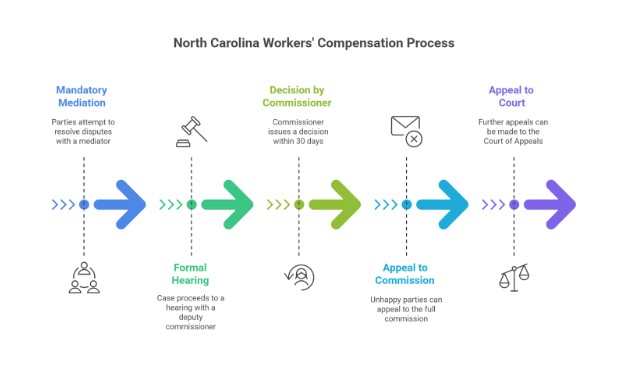
The North Carolina workers’ compensation hearing process begins with mediation and proceeds to formal hearings and decisions.
Most cases begin with mandatory mediation before they are presented to a deputy commissioner, who hears evidence and testimony.
Pre-Hearing Mediation Requirements
North Carolina makes mediation mandatory for workers’ comp cases before you can go to a formal hearing. The Industrial Commission organizes these meetings to attempt to resolve disputes without requiring everyone to go to court.
Both sides have to show up with their lawyers. The injured worker presents their case, and the employer or insurance company presents theirs.
Main mediation requirements:
- Everyone involved (and their lawyers) has to be there. Post-Covid, many of these proceedings take place by video-conference.
- Both sides work in good faith to try and resolve their issues
- Everything said stays confidential—it can’t be used later (although the client should heed the attorney’s advice as to when to speak).
- A mediator guides the conversation and tries to help both sides reach an agreement.
The mediation process helps expedite settlements and results in fewer formal hearings. These sessions usually last a few hours, with breaks for private talks between lawyers and their clients.
If mediation is unsuccessful, the case proceeds to a formal hearing with a deputy commissioner.
Hearing Structure
The workers’ compensation hearing takes place in front of a deputy commissioner from the North Carolina Industrial Commission. It’s not as formal as a jury trial, but you still have to follow certain rules.
Here’s the basic structure:
- Both sides give opening statements
- They present evidence—medical records, documents, and more
- Witnesses testify—the injured worker, doctors, and sometimes employer reps
- Opposing counsel cross-examines the witnesses
- Each side wraps up with a closing argument
The injured worker usually goes first, explaining how the injury occurred and what has changed since then. Medical experts might weigh in about treatment and disability ratings.
Employers attempt to poke holes in the claim or dispute the benefits. Sometimes they bring in surveillance videos, independent medical exams, or other witnesses to challenge what happened.
Deputy commissioners ask questions as they go to clear up anything that’s confusing. They also control what evidence gets in and how long things take.
Decision Process And Appeals
Deputy commissioners write up their decisions within 30 days after the hearing ends. They cover all the disputed issues—medical treatment, wage replacement, disability ratings, and so on.
Possible outcomes:
- Approval of all benefits and treatment requested
- Partial approval—some things get denied or changed
- Complete denial of the workers’ comp claim
- Remand—they send it back for more medical evaluation or evidence
If you’re not happy with the decision, you can appeal to the full Industrial Commission within 15 days. The Commission reviews the deputy’s findings and can agree with, disagree with, or modify the decision.
If things still don’t go your way, you can take it to the North Carolina Court of Appeals. These courts stick to legal questions—they won’t rehash the facts from the original hearing.
The workers’ comp process can drag out for months or even years if it goes through multiple appeals.
Morrison Law Firm’s Post-Hearing support helps you understand your hearing decision and file appeals if needed—avoid costly mistakes. Ready to discuss your case? Contact us now.
If you’re ready to get started, call us now!
Appeals: What If You Don’t Win?
If you lose your workers’ comp hearing, you’re not out of options. The appeal process in North Carolina has several levels, starting with the Full Commission and proceeding to the state courts.
Appeal To The Full Commission
If you lose your first hearing, you can appeal to the Full Commission within 30 days of the deputy commissioner’s decision. This is the first step in North Carolina’s appeal system.
The Full Commission is made up of three commissioners who review your case. They look at the evidence from the original hearing and the deputy’s findings.
What you need for a Full Commission appeal:
- File Form 44 within 15 days
- Send in a written brief explaining why the decision was wrong
- Add any supporting evidence or legal arguments
The Full Commission can agree with the original decision, change it, or even order a new hearing if it identifies significant errors.
Most appeals center on medical treatment, disability ratings, or whether the injury was work-related. They review everything before deciding.
Further Appeals Up To the NC Court Of Appeals And the NC Supreme Court
If the Full Commission turns you down, you can appeal to the North Carolina Court of Appeals within 30 days. That takes your case into the regular court system.
The Court of Appeals only looks for legal mistakes the Full Commission made. They don’t revisit the facts from your hearing.
Here’s what a court appeal involves:
- File a notice of appeal
- Prepare legal briefs
- Oral arguments in front of judges
- Wait for a written decision
Appeals to the NC Supreme Court are rare. The Supreme Court picks which cases it wants to hear, usually only if there’s a big legal question or conflicting decisions from lower courts.
Success rates drop the further you go. You’ve got a better shot at benefits if you appeal the initial decision, but higher court appeals need strong legal arguments about errors or misapplied law.
Role Of Legal Representation In Appeals
Having a lawyer becomes more important as you climb the appeal ladder. Finding a workers’ comp attorney might be your best move if you’re facing a denial.
Lawyers are familiar with the deadlines and paperwork. They’re skilled at writing briefs and making arguments to commissioners and judges.
Why legal representation helps:
- They know all the appeal procedures
- They’re experienced at gathering evidence, and making sure that evidence was admitted at the original hearing
- They write strong legal briefs
- They understand workers’ comp law from top to bottom
Appeals have strict deadlines and technical rules. Miss a deadline or file the wrong form, and your case could be over for good.
Attorneys can also tell you if your appeal has a chance for success. They’ll look for legal mistakes in the original decision that could help you win.
Court reporters document all testimony during appeals, so lawyers can use the official record to build their arguments if your case goes to a higher court.
Checklist — How To Prepare For A Hearing
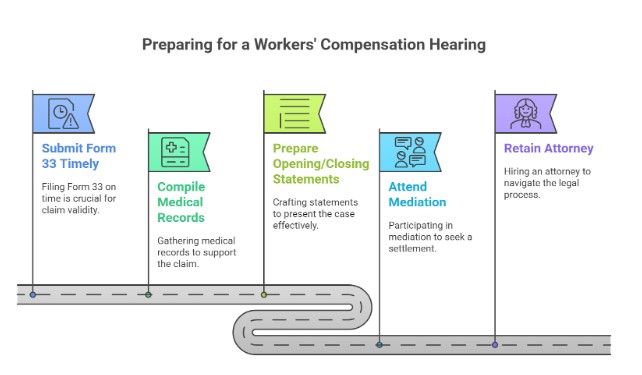
Getting ready means turning in all required forms on time, gathering your medical records, and figuring out what you’ll say.
Having an experienced workers’ comp attorney on your side can make a huge difference in how things turn out.
Submit Form 33 Timely
Filing Form 33 on time is key if you want to keep your workers’ compensation claim alive. This form asks the North Carolina Industrial Commission for a hearing when you and your employer or their insurance company can’t agree.
If you received any compensation, you must file your Form 33 within two years of the last payment.
If you have never received benefits, you have two years from the date of the injury. Miss this window and, well, you probably lose your shot at the claim.
The form asks for some pretty specific info, like:
- Injury details and when it happened
- Employment info and how to reach your employer
- Medical treatment and your doctor’s information
- What you want—maybe medical help, perhaps wage replacement
Hang onto copies of everything you submit. The Industrial Commission needs to actually get the form by the deadline, not just see a postmark.
Compile Medical Records, Impairment Evaluations, Witness Statements
Medical records basically make or break a workers’ comp case. Your doctor needs to show, in writing, that your injuries really came from work.
You’ll want these medical records:
- Emergency room or urgent care reports from the start
- Notes from every healthcare provider you’ve seen
- Test results like X-rays, MRIs, or CT scans
- Physical therapy notes and progress updates
- Impairment ratings from doctors that the insurance company accepts
The best medical reports spell out what you can’t do now and any work restrictions. When your doctor explains why work caused your injuries and why you still need treatment, hearing officers tend to listen.
Witness statements help. If coworkers saw what happened, ask them to write down exactly what they saw.
Employment records also matter. They show what your job involved and how much you were earning before you got hurt.
Prepare Opening/Closing Statements And Testimony
Testifying clearly and staying organized helps the hearing officer understand your side. You should practice your testimony ahead of time.
For opening statements, hit these points:
- Quick summary of the injury and how it happened
- Timeline of your medical care
- What you still can’t do physically
- Which issues are still up in the air
Your story needs to align with your earlier statements and the information in your medical records. If things don’t line up, it hurts your case.
To get ready, try this:
- Go over all your medical and job records
- Practice answering tough questions
- Put your evidence in order by date
- Get exhibits and anything visual ready
Wrap up with a closing statement that sums up your evidence and tells the hearing officer why North Carolina law supports your claim.
Attend Mediation With Documentation
Mediation gives you a shot at settling things before a formal hearing. Both sides sit down with a neutral mediator to see if there’s any middle ground.
Bring every bit of paperwork you have to mediation—medical records, pay info, emails with the insurance company, all of it.
Stuff you’ll need at mediation:
- Wage statements from your employer if there is a contest about your average weekly wage
- All your doctors’ reports
- Impairment evaluations
- Proof of lost wages and medical bills
If mediation is successful, you may receive your benefits more quickly. However, don’t accept a bad deal just to avoid a hearing—it’s not worth it.
The mediator can’t make anyone settle. If you can’t agree, the case moves on to a formal hearing with an Industrial Commission deputy commissioner.
Retain Experienced Workers’ Comp Attorney
Workers’ comp hearings can get complicated. A good attorney is familiar with North Carolina’s rules and knows how to navigate the process effectively.
Here’s what a workers’ comp attorney usually does:
- Files all the right paperwork
- Gathers your medical evidence
- Questions witnesses and doctors
- Negotiates with insurance companies
- Presents your case at the hearing
Most attorneys work on contingency, so you don’t pay anything up front. They only get paid if you win benefits.
It’s advisable to involve a lawyer early. If you wait until right before the hearing, they won’t have time to dig in and build your case.
Having a lawyer really matters if your claim gets denied, your treatment is disputed, or you have a permanent disability rating on the line.
What To Do After The Hearing / Next Steps
After your workers’ comp hearing, you mostly wait for the judge’s decision. It’s a peculiar limbo, and you need to be aware of your options for appeals or settlement if things don’t go your way.
Explanation Of Wait Time For Decision
Hearing officers usually take six months to write up a decision after the hearing. The more complicated your case, the longer it may take to resolve.
North Carolina judges must consider all the evidence, testimony, and medical records before ruling. If you have multiple injuries or doctors can’t agree, expect a longer wait.
What can slow things down?
- Lots of witnesses
- Tons of medical records
- Tricky legal questions
- How busy the hearing officer is
During this time, continue to follow your doctor’s instructions. If you stop treatment, it could hurt your case if you end up appealing.
Insurance companies can’t just cut off approved benefits while you’re waiting. If they do, contact your lawyer immediately.
How To Read And Understand The Decision
The judge’s decision spells out whether your claim is accepted or denied. If you win, it lists what benefits you get and for how long.
Look for these parts in the decision:
- Award summary: What you’re getting
- Findings of fact: What the judge believes happened
- Reasoning: Why the judge decided this way
- Effective dates: When your benefits start and stop
If you lose, the decision should explain why. Usually, it’s not enough medical proof or a fight over whether it happened at work.
The decision informs you of the appeal period, typically 30 days from the date listed. If you want to appeal, don’t wait around.
Attorneys can help you understand the legal jargon and medical terms. Sometimes they spot appeal reasons most folks wouldn’t catch.
When To File An Appeal Or Negotiate A Settlement
If you lose or don’t receive enough benefits, consider appealing. You have to file with the North Carolina Industrial Commission within 15 days.
Reasons you might appeal:
- The judge denied your claim, even though your injury was clearly work-related
- You got awarded too little in weekly pay
- The judge said no to the medical treatments you need
- You don’t agree with the disability rating
Even after a decision is made, insurance companies sometimes offer a lump sum to settle. This happens win or lose.
Talk over any settlement offer with your lawyer. Usually, taking a settlement means you give up rights to future care or compensation for this injury.
Appeals often result in additional hearings and can take several months or even years. However, you have the opportunity to present new evidence or challenge the initial decision.
Contact Morrison Law Firm for a Hearing Consultation
Morrison Law Firm guides people through the post-hearing process in North Carolina workers’ compensation cases. Their attorneys break down complicated decisions and walk clients through every option, even when things feel overwhelming.
They jump in to help with appeal filings if a judge hands down a tough ruling. The team tracks deadlines and gathers additional evidence to give appeals a stronger chance.
Services offered after hearings:
- Decision analysis and explanation
- Appeal preparation and filing
- Settlement negotiation assistance
- Ongoing case management
Post-hearing services include:
- Decision analysis and plain-language explanation
- Appeal preparation and filing support
- Settlement negotiation with insurers
- Ongoing case management to protect your benefits
Clients consistently highlight how much of a difference this approach makes:
“Mr. Morrison has been so wonderful in helping my husband and me navigate my husband’s workers ‘ compensation claim… It’s a blessing to have his expertise in our corner.” — Alicia Thompson.
“We started out trying to handle my workers’ compensation case on our own, but quickly found we were over our heads. Mr. Morrison got us to a point that I was receiving the pay I should be and ensured my appointments were made on time.” — Christopher Thompson.
“They secured the best possible outcome in my case, and I will always be grateful. You won’t meet a group of people more dedicated to your best interests.” — J V ‘Jay’ Deans
The firm is also proactive in settlement negotiations, pushing for compensation that accounts for both immediate and long-term medical needs tied to workplace injuries.
If you schedule a consultation early, you’ll avoid common post-hearing mistakes that often delay or reduce benefits.
Morrison Law Firm offers complimentary case evaluations, providing an honest assessment of your situation and a clear plan for next steps.
With Morrison Law Firm’s Appeal Preparation service, you don’t face denials alone—secure full medical and wage benefits. Don’t wait—call to schedule your consultation.
Contact Us Today For An Appointment
Frequently Asked Questions
What are the most common workers’ comp hearing outcomes in North Carolina?
The most common outcomes include an award of wage replacement benefits, approval or denial of medical treatment, assignment of an impairment rating with compensation, or full/partial denial of the claim.
How long does it take to get a decision after a workers’ comp hearing in NC?
A Deputy Commissioner typically issues a written decision within several weeks to a few months after the hearing, depending on the case’s complexity and the review of evidence.
Can a workers’ comp claim be denied at a hearing in North Carolina?
Yes. If the Industrial Commission finds insufficient evidence of a work-related injury or disability, the claim may be denied; however, workers retain the right to appeal.
What is an impairment rating in NC workers’ comp cases?
An impairment rating is a percentage assigned by a doctor once you reach maximum medical improvement. It determines how many weeks of compensation you may receive for permanent partial disability.
Can you appeal a workers’ comp hearing decision in North Carolina?
Yes. You can file an appeal with the NC Industrial Commission’s Full Commission within 15 days of the decision. Further appeals can go to higher courts.
Do most workers’ comp cases settle before or after the hearing?
Many claims are settled through mediation before the hearing, but some cases are only resolved after the hearing decision or during the appeals process.
Do I need a lawyer for a workers’ comp hearing in NC?
While not legally required, having an attorney significantly improves your chances of securing fair benefits, navigating appeals, and effectively handling medical and wage evidence.

